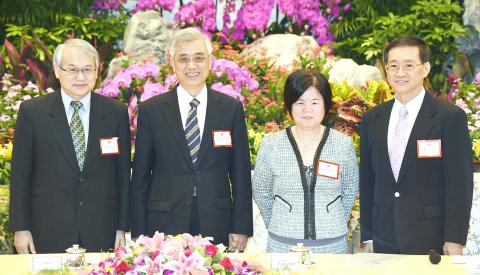President Ma Ying-jeou’s (馬英九) latest nominations for grand justices drew criticism yesterday, as Democratic Progressive Party (DPP) legislators and civic groups questioned not only his right to nominate candidates, but also whether a judge who acquitted him in a corruption case is an appropriate nominee.
“The tenures of grand justices and the president have been designed in such a way so as to avoid having one president recommend candidates for the Council of Grand Justices twice” during his or her term in office, Taiwan Jury Association chairman Cheng Wen-lung (鄭文龍) told a news conference in the legislature yesterday morning.
“After making all these nominations, the Council of Grand Justices would be Ma’s Council of Grand Justices, and we would have an authoritarian constitutional system,” Cheng said.

Photo: Wang Min-wei, Taipei Times
Based on the current system, seven of the 15 grand justices are to serve four years, while the other four would serve eight years to avoid having one president nominate all sitting grand justices, Cheng said.
The candidates have to be confirmed by the legislature.
“Due to the Chinese Nationalist Party’s (KMT) boycott of the four nominees made by the previous president, Ma was able to nominate 11 grand justices in 2008,” Cheng said. “If he nominates four more, all 15 of them would be Ma’s nominees.”
DPP Legislator Tien Chiu-chin (田秋堇) agreed, urging Ma to withdraw his nominations to allow the next president, who is to be elected next year, to do so.
“Otherwise, it would create chaos in society,” she said.
Citizens’ Congress Watch executive director Chang Hung-lin (張宏林) urged legislators to reject the four nominees: lawyer Huang Horng-shya (黃虹霞), Deputy Minister of Justice Wu Chen-huan (吳陳鐶), National Taiwan University law professor Tsai Ming-cheng (蔡明誠) and Shilin District Court President Lin Jyun-yi (林俊益).
Aside from the constitutional issue, DPP Legislator Huang Wei-cher (黃偉哲) questioned Ma’s choice of Lin, a former Supreme Court judge who acquitted Ma of corruption charges in connection with the use of his special allowance during his stint as Taipei mayor.
“It is obvious that Ma is trying to pay Lin back by nominating him as a grand justice,” Huang said.
In response to the criticism, Ma said that it is his constitutional obligation to nominate grand justices when the seats become vacant.
“The president or the legislature would be acting unconstitutionally if we fail to fulfill our constitutional duties,” he said.
Presidential Office spokesperson Charles Chen (陳以信) said the candidates have been recommended by a special review commission, and the president was merely making nominations accordingly.

CHAOS: Iranians took to the streets playing celebratory music after reports of Khamenei’s death on Saturday, while mourners also gathered in Tehran yesterday Iranian Supreme Leader Ayatollah Ali Khamenei was killed in a major attack on Iran launched by Israel and the US, throwing the future of the Islamic republic into doubt and raising the risk of regional instability. Iranian state television and the state-run IRNA news agency announced the 86-year-old’s death early yesterday. US President Donald Trump said it gave Iranians their “greatest chance” to “take back” their country. The announcements came after a joint US and Israeli aerial bombardment that targeted Iranian military and governmental sites. Trump said the “heavy and pinpoint bombing” would continue through the week or as long

TRUST: The KMT said it respected the US’ timing and considerations, and hoped it would continue to honor its commitments to helping Taiwan bolster its defenses and deterrence US President Donald Trump is delaying a multibillion-dollar arms sale to Taiwan to ensure his visit to Beijing is successful, a New York Times report said. The weapons sales package has stalled in the US Department of State, the report said, citing US officials it did not identify. The White House has told agencies not to push forward ahead of Trump’s meeting with Chinese President Xi Jinping (習近平), it said. The two last month held a phone call to discuss trade and geopolitical flashpoints ahead of the summit. Xi raised the Taiwan issue and urged the US to handle arms sales to

State-run CPC Corp, Taiwan (CPC, 台灣中油) yesterday said that it had confirmed on Saturday night with its liquefied natural gas (LNG) and crude oil suppliers that shipments are proceeding as scheduled and that domestic supplies remain unaffected. The CPC yesterday announced the gasoline and diesel prices will rise by NT$0.2 and NT$0.4 per liter, respectively, starting Monday, citing Middle East tensions and blizzards in the eastern United States. CPC also iterated it has been reducing the proportion of crude oil imports from the Middle East and diversifying its supply sources in the past few years in response to geopolitical risks, expanding

Pro-democracy media tycoon Jimmy Lai’s (黎智英) fraud conviction and prison sentence were yesterday overturned by a Hong Kong court, in a surprise legal decision that comes soon after Lai was jailed for 20 years on a separate national security charge. Judges Jeremy Poon (潘兆初), Anthea Pang (彭寶琴) and Derek Pang (彭偉昌) said in the judgement that they allowed the appeal from Lai, and another defendant in the case, to proceed, as a lower court judge had “erred.” “The Court of Appeal gave them leave to appeal against their conviction, allowed their appeals, quashed the convictions and set aside the sentences,” the judges